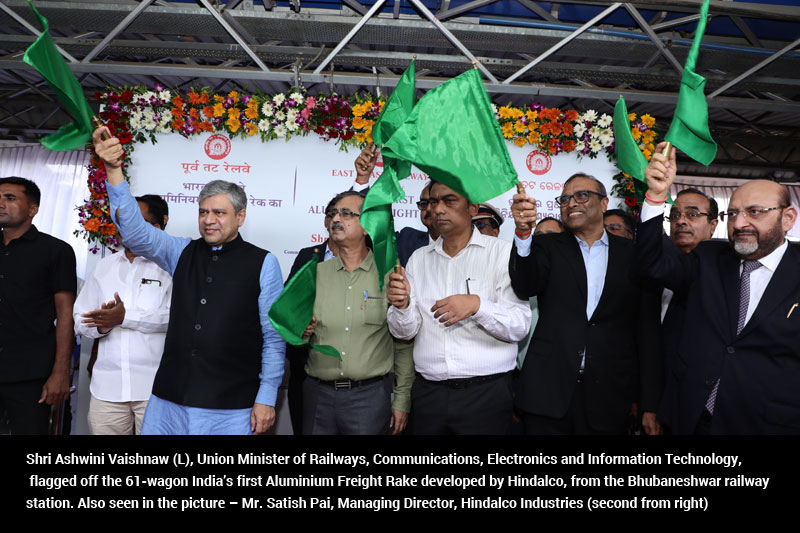16 October, 2022
- Significant milestone in India's modernisation drive in mass transportation
- Switch to aluminium significantly shrinks carbon footprint for Indian railways; a single rake can save over 14,500 tonnes of CO2 over its lifetime
- The silvery-white metal is the preferred choice for metro trains worldwide
- Move precursor to Hindalco's plan to contribute to lighter, cost-efficient and durable Aluminium rail car body structures for high-speed passenger trains.
Bhubaneswar: Hindalco today launched India's first all-aluminium freight rail rakes, helping fast-track the country's ambitious plan to modernise freight transportation and enable large carbon savings for Indian Railways.
The gleaming rakes are 180 tonnes lighter than existing steel rakes, can carry 5-10 per cent more payload, consume less energy with relatively negligible wear and tear to rolling stock and rails.
Flagging off the new 61-wagon rake from Bhubaneswar station, which will carry coal for Hindalco's Aditya Smelter in Lapanga, Odisha, Shri Ashwini Vaishnaw, Union Minister of Railways, Communications, Electronics and Information Technology, said, "This is a proud moment for the country and our drive for indigenisation as these lightweight aluminium wagons are a big innovation for Indian Railways.
"These wagons save 14,500 tonnes of CO2 emissions, have more carrying capacity, consume less energy and are corrosion-resistant. They are 100 per cent recyclable and even after 30 years, they will be as good as new. These aluminium wagons will enable us to achieve our climate goals," he adds.
The bottom discharge aluminium freight wagon, specifically designed to carry coal, is tipped to reduce the carbon footprint measurably. For every 100 kg weight reduction of the wagon, the lifetime CO2 saving is 8-10 tonnes. This translates to a saving of more than 14,500 tonnes of CO2 for a single rake.
With the Railways planning to deploy more than one lakh wagons in the coming years, the potential annual CO2 reduction could be to the tune of over 25 lakh tonnes, with say 15-20 per cent shift to aluminium wagons – a notable contribution to the country's sustainability goals.

Mr. Satish Pai, Managing Director, Hindalco Industries said, "The launch of the India's first aluminium freight rake is a testimony to our capability and commitment to offer smart and sustainable solutions for nation building. Hindalco is steadfast in bringing together the best of global technologies with local resources to make Indian Railways' logistics more efficient and contribute to the vision of an Atmanirbhar Bharat."
The new generation wagons, fabricated by M/S BESCO based on RDSO-approved design are made from high strength aluminium alloy plates and extrusions, indigenously made at Hindalco's state-of-the-art rolling facility in Hirakud, Odisha with extrusions from the company's Renukoot plant in UP, leveraging its global technology. These all-aluminium rakes offer 19 per cent higher payload to tare weight ratio, which will have a transformative impact on the Railways' logistics and operational efficiency.
The freight sector in India is expected to grow at more than 7 per cent CAGR to 15-billion tonnes by 2050, with the energy-efficient and eco-friendly Railways expected to notably increase its volume share from the current 18 per cent.
Hindalco is also planning to participate in manufacturing of aluminium coaches for high-speed passenger trains. Aluminium trains command a lion's share in the United States, Europe and Japan because of attributes such as sleek, aerodynamic designs and their ability to tilt at high speeds without going off the rails.
Aluminium is the preferred choice for metro trains worldwide for their durability and most importantly – passenger safety, as it has improved crashworthiness or superior crash absorption capability. Indian Railways have already announced their plans to make aluminium bodied Vande Bharat train sets. Hindalco is committed to bring in this revolutionary change in India and is engaged in discussions with the global partners to set up conducive ecosystem in India.

